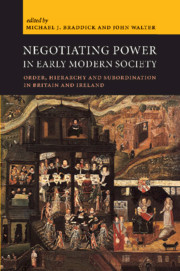Book contents
- Frontmatter
- Contents
- Notes on contributors
- Acknowledgements
- List of abbreviations and conventions
- Introduction. Grids of power: order, hierarchy and subordination in early modern society
- 1 Ordering the body: illegitimacy and female authority in seventeenth-century England
- 2 Child sexual abuse in early modern England
- 3 Sex, social relations and the law in seventeenth- and eighteenth-century London
- 4 Exhortation and entitlement: negotiating inequality in English rural communities, 1550–1650
- 5 Public transcripts, popular agency and the politics of subsistence in early modern England
- 6 ‘Bragging and daring words’: honour, property and the symbolism of the hunt in Stowe, 1590–1642
- 7 Administrative performance: the representation of political authority in early modern England
- 8 Negotiating order in early seventeenth-century Ireland
- 9 Order, orthodoxy and resistance: the ambiguous legacy of English puritanism or just how moderate was Stephen Denison?
- 10 Making orthodoxy in late Restoration England: the trials of Edmund Hickeringill, 1662–1710
- Notes
- Index
5 - Public transcripts, popular agency and the politics of subsistence in early modern England
Published online by Cambridge University Press: 13 March 2010
- Frontmatter
- Contents
- Notes on contributors
- Acknowledgements
- List of abbreviations and conventions
- Introduction. Grids of power: order, hierarchy and subordination in early modern society
- 1 Ordering the body: illegitimacy and female authority in seventeenth-century England
- 2 Child sexual abuse in early modern England
- 3 Sex, social relations and the law in seventeenth- and eighteenth-century London
- 4 Exhortation and entitlement: negotiating inequality in English rural communities, 1550–1650
- 5 Public transcripts, popular agency and the politics of subsistence in early modern England
- 6 ‘Bragging and daring words’: honour, property and the symbolism of the hunt in Stowe, 1590–1642
- 7 Administrative performance: the representation of political authority in early modern England
- 8 Negotiating order in early seventeenth-century Ireland
- 9 Order, orthodoxy and resistance: the ambiguous legacy of English puritanism or just how moderate was Stephen Denison?
- 10 Making orthodoxy in late Restoration England: the trials of Edmund Hickeringill, 1662–1710
- Notes
- Index
Summary
In the summer of 1596, the balladeer Thomas Deloney was facing imprisonment. While Londoners were struggling with the consequences of harvest failure, Deloney had published ‘a certein ballad containing a Complaint of the great Want and Scarcitie of Corn within the Realm’. His offence was to have represented the Queen speaking ‘with hir people in dialogue-wise in very fond and undecent sort’ and to have prescribed ‘orders for ye remedying of this dearth of Corn extracted … out of ye booke published by your L[ordships] the last year, butt in that vaine & undiscreet manner as that therby the poor may aggravate their grief & take occasion of soon discontentment’. The episode encapsulates the argument of this chapter. Deloney's ballad spoke to a popular political culture in which the monarch was seen as a natural defender of the poor, and where legitimation for popular protest was derived from government measures designed to anticipate and address popular grievances. Although Deloney was threatened with imprisonment, in reality the structures of English early modern government made such a dialogue between rulers and ruled a political necessity throughout the period. Out of that dialogue, the ruled derived legitimation for a political agency otherwise denied to them by a state that proscribed popular action and by a church that preached passivity in the face of hardship.
- Type
- Chapter
- Information
- Negotiating Power in Early Modern SocietyOrder, Hierarchy and Subordination in Britain and Ireland, pp. 123 - 148Publisher: Cambridge University PressPrint publication year: 2001
- 10
- Cited by



